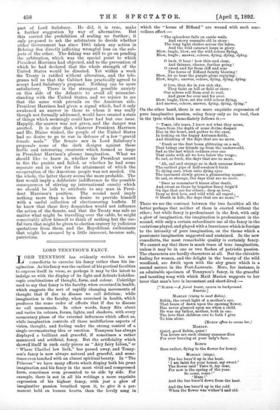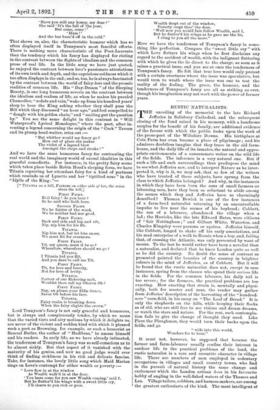LORD TENNYSON'S FANCY.
TOR]) TENNYSON has evidently written his new comedietta to exercise his fancy rather than his im- agination. As his fancy was the earliest of his poetical faculties to express itself in verse, so perhaps it may be the latest to indulge us with the display of its light and delicate kaleidos- copic combinations of thought, form, and colour. Coleridge used to say that fancy is the faculty, when exercised in health, which suggests the sort of rapidly changing movements of thought that if due to disease we call delirium; while imagination is the faculty, when exercised in health, which produces the same order of effects that if due to disease we call monomania. In other words, fancy flits about and varies its colours, forms, lights, and shadows, with every momentary phase of the external influences which affect us, while imagination controls all these multifarious aspects of vision, thought, and feeling under the strong control of a single overmastering idea or emotion. Tennyson has always displayed a brilliant and graceful, if sometimes a rather mannered and artificial, fancy. But the artificiality which showed itself in such early pieces as "Airy fairy Lilian," or "Where Claribel low lieth," has passed away, and Tenny- son's fancy is now always natural and graceful, and some- times even touched with an almost spiritual beauty. In "The Princess" we have many efforts which display both his great imagination and his fancy in the most vivid and compressed form, sometimes even presented to us side by side. For example, there is not in all his writings a more exquisite expression of his highest fancy, with just a glow of imaginative passion breathed upon it, to give it a per- manent hold on human hearts, than the lovely song in
which the "horns of Blfland " are wound with such mar- venous effect :—
" The splendour falls on castle walls
And snowy summits old in story : The long light shakes across the lakes, And the wild cataract leaps in glory. Blow, bugle, blow, set the wild echoes flying, Blow, bugle ; answer, echoes, dying, dying, dying.
0 hark, 0 hear ! how thin and clear, And thinner, clearer, farther going ! 0 sweet and far from cliff and scar The horns of Elfland faintly blowing ! Blow, let us hear the purple glens replying : Blow, bugle; answer, echoes, dying, dying, dying.
0 love, they die in yon rich sky, They faint on hill or field or river : Our echoes roll from soul to soul, And grow for ever and for ever.
Blow, bugle, blow, set the wild echoes flying, And answer, echoes, answer, dying, dying, dying."
On the other hand, there is no more exquisite expression of pure imaginative passion, using fancy only as its tool, than in the lyric which immediately follows it :— "‘ Tears, idle tears, I know not what they mean, Tears from the depth of some divine despair Rise in the heart, and gather to the eyes, In looking on the happy Autumn-fields, And thinking of the days that are no more.
Fresh as the first beam glittering on a sail, That brings our friends up from the underworld, Sad as the last which reddens over one That sinks with all we love below the verge ; So sad, so fresh, the days that are no more.
Ah, sad and strange as in dark summer dawns The earliest pipe of half-awaken'd birds To dying ears, when unto dying eyes The casement slowly grows a glimmering square ; So sad, so strange, the days that are no more.
Dear as remember'd kisses after death, And sweet as those by hopeless fancy feign'd On lips that are for others ; deep as love, Deep as first love, and wild with all regret ; 0 Death in Life, the days that are no more.' "
There we see the contrast between the two faculties all the better perhaps that neither of them is exerted without the other; but while fancy is predominant in the first, with only a glow of imagination, the imagination is predominant in the second, with only a certain subordinate use of the fancy in the variations played, and played with a luxuriance which is foreign to the intensity of pure imagination, on the theme which a passionate imagination suggested and sustained. In the new comedietta, the most remarkable quality is certainly fancy. We cannot say that there is much trace of true imagination, unless it may be in one or two flashes of patriotic passion. The characters are hardly characters at all. But the chivalric feeling for women, and the delight in the beauty of the wild woodland, are dwelt upon with the airy grace which is a second nature in the Poet-Laureate. Here, for instance, is an admirable specimen of Tennyson's fancy, in the graceful and taunting song with which Maid Marian suggests to her lover that man's love is inconstant and short-lived :— ["SCENE.—A forest bower, cavern in background.
Sunrise.]
MARIAN (rising to meet Robin).
Robin, the sweet light of a mother's eye, That beam of dawn upon the opening flower, Has never glanced upon me when a child.
He was my father, mother, both in one.
The love that children owe to both I give To him alone. (Rosin offers to caress her.)
MARIAN.
Quiet, good Robin, quiet ! You lovers are such clumsy summer-flies For ever buzzing at your lady's face.
ROBIN.
Bees rather, flying to the flower for honey.
Meaux (sings).
The bee buzz'd up in the heat. I am faint for your honey, my sweet.' The flower said Take it, my dear, For now is the spring of the year. So come, come !'
Hum !'
And the bee buzz'd down from the heat.
And the bee buzz'd up in the cold When the flower was wither'd and old.
Have you still any honey, my dear 9' She said 'It's the fall of the year, But come, come ! '
'Hum!'
And the bee buzz'd off in the cold."
That shows us, also, the characteristic humour which has so often displayed itself in Tennyson's most fanciful efforts.
There is nothing more characteristic of the Poet-Laureate than the tendency which his fancy has displayed for rioting in the contrast between the flights of idealism and the common prose of real life. In the little song we have just quoted, he enjoyed the contrast between love's passionate attestations of its own truth and depth, and the capricious coldness which it too often displays in the end; and so, too, he is always fascinated by the contrast between the world of fairy-lore and the prosaic realities of common life. His " Day-Dream " of the Sleeping Beauty, is one long humorous reverie on the contrast between the idealism and realism of life, as when he makes his puzzled Chancellor, "sedate and vain," wake up from his hundred years' sleep to hear the King asking whether they shall pass the Bill which they discussed "an hour ago," and feel compelled to "dangle with his golden chain," and "smiling put the question by." You see the same delight in this contrast in "Will Waterproof's Lyrical Monologue," where the poet, after in- venting a legend concerning the origin of the " Cock " Tavern and its plump head-waiter, cries out :—
"But whither would my fancy go ? How out of place she makes The violet of a legend blow Amongst the chops and steaks !"
And we have the same humorous fancy for contrasting the real world and the imaginary world of unreal idealities in this graceful comedietta. For instance, in the pretty fairy scene which takes place beside Robin Hood's sleeping form, we have Titania reproving her attendant fairy for a kind of pertness which reminds us of Lynette and her " tiptilted nose" in the "Idylls of the King: "—
[" TITANIA on a hill, Riming on Miser side of her, the moon above the hilt.]
FIRST FAIRY.
Evil fairy ! do you hear ? So he said who lieth here.
SECOND FAIRY.
We be fairies of the wood, We be neither bad nor good.
FIRST FAIRY.
Back and side and hip and rib, Nip, nip him for his fib.
TITANTA.
Nip him not, but let him snore.
We must flit for evermore.
FIRST FAIRY.
Tit, my queen, must it be so ?
Wherefore, wherefore should we go ?
TITANIA.
I Titania bid you flit, And you dare to call me Tit.
FIRST FAIRY.
Tit, for love and brevity, Not for love of levity.
TITANIA.
Pertest of our flickering mob, Wouldst thou call my Oberon Ob ?
FIRST FAIRY.
Nay, an please your Elfin Grace,
Never Ob before his face.
TITANIA.
Fairy realm is breaking down When the fairy slights the crown?'
Lord Tennyson's fancy is not only graceful and humorous, but is always and conspicuously tender, by which we mean that the varied tints and airy motions by which it delights us, are never of the violent and sudden kind with which it pleased such a poet as Browning, for example, or such a humorist as
Samuel Butler, the author of " Hudibras," to amuse himself and his readers. In early life, as we have already intimated, the tenderness of Tennyson's fancy was so self-conscious as to be almost sickly. But that aspect of it vanished with the
maturity of his genius, and now no good judge would ever think of finding sickliness in his rich and delicate fancies.
Take, for instance, the lovely little song which Maid Marian sings on Love's contempt for either wealth or poverty :—
"Love flew in at the window
As Wealth walk'd in at the door.
'You have come for you saw Wealth coming,' said I.
But he flutter'd his wings with a sweet little cry, I'll cleave to you rich or poor. Wealth dropt out of the window, Poverty crept thro' the door.
Well now you would fain follow Wealth, said I, But he flutter'd his wings as he gave me the lie, I cling to you all the more."
Here we have the tenderness of Tennyson's fancy in some- thing like perfection. Compare the "sweet little cry" with
which Love flutters his wings when he first disclaims any regard to the accident of wealth, with the indignant flattering with which he gives the lie direct to the charge, so soon as it raises a practical issue, and you see at once the tenderness of Tennyson's fancy. He felt that true love would only protest with a certain sweetness where the issue was speculative, but would turn to wrath where the issue was one to test the reality of the feeling. The grace, the humour, and the tenderness of Tennyson's fancy are all as striking as ever, though his imagination may not work with the power of former years.



































 Previous page
Previous page